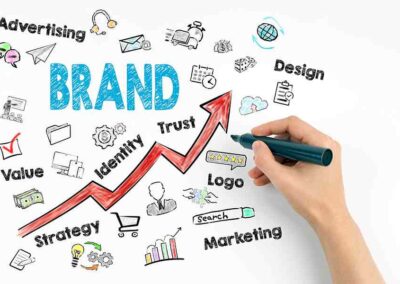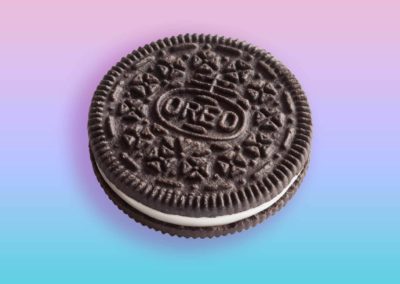Branding shapes the heartbeat of a business, carving out a distinct identity with a memorable tagline and marketing strategy in a bustling industry, ensuring a lasting impression on the market. It’s the brand identity secret sauce that turns casual browsers into loyal customers, recognizing your corporate brand’s logo and tagline like an old friend in a sea of strangers, instantly connecting with your brand name. Personal brand vs business brand – each dances to its own rhythm in the marketing arena, but both aim for the same endgame: to stake their claim in people’s minds as a leader or an identity designer through social media presence. As we dive deep into the marketing strategies, we’ll unravel how these branding titans clash and cooperate, setting the organization’s stage for success through unique values and tailored experiences for their target consumers, led by a visionary leader.
From mom-and-pop shops to corporate giants, brands breathe life into marketing strategies, etching their names onto the fabric of history as leaders in creating value for consumers and shaping personal identity. Let’s explore this marketing battleground where your business name is king and every consumer interaction is a chance for your brand’s persona to shine.
Defining Personal and Business Brands
Personal Brand Nuances
Personal brands are like fingerprints. Personal identity and brand identity are unique to every individual and corporation, reflecting who you are, what you stand for, and the essence of your professional brand or corporate brand. Think of your personal branding as your own story, told in a way that shows off your name, personality, and values. It’s the professional brand vibe people get when they interact with your name online or offline, aligned with your brand goals.
Imagine scrolling through someone’s social media profile. You can quickly sense their style, humor, beliefs, and even their name—that’s personal branding at work! It’s powerful because it builds a professional brand connection with others who share or admire those same qualities, aligning with your brand goals and name.
Business Brand Basics
Now let’s flip the script to business brands. These are the professional brand big guns representing entire companies or products, aligned with their brand goals and name. A business brand isn’t just about colors or logos; it’s the heart of what a company is all about—its mission, its promise to customers, and where it stands in the crowded marketplace. It’s also inherently tied to the name, which encapsulates all these elements and becomes synonymous with the brand’s identity.
Consider your favorite sneaker brand name or fast-food joint name. There’s something about their professional brand that aligns with your brand goals, making you pick them over others, right? That ‘something’ is their business brand doing its magic—making sure they stick in your head as the go-to choice.
Influence on Perception
Both personal and business brands have a superpower: influencing how people see you or your company. Crafting your professional brand is like wearing a pair of glasses that lets folks see the world from your perspective—or at least gives them an idea of what standing in your shoes might feel like, aligning with your brand goals.
When done right, both types of branding can make people nod their heads and think, “Yeah, I get what this person (or company) is all about.” That understanding breeds trust which is worth its weight in gold.
Trust Through Branding
And speaking of trust in your professional brand—it doesn’t come easy but once you’ve got it, hold onto it tight! Whether we’re talking personal or business brands, building trust means showing up consistently with quality stuff—be it content for individuals or products for businesses—and keeping promises made.
A solid example of building a professional brand would be a YouTuber who always drops entertaining videos on schedule versus a restaurant known for never letting down on taste. Both build trust through their respective brands by being reliable stars in their arenas.
Key Differences Between Personal and Business Brands
Personal brands reflect an individual’s essence. Business brands, on the other hand, outlive their creators.
Personal Brand Identity
Your personal brand is like your signature. It’s unique to you and tells your story. Think about celebrities or influencers; their names alone evoke certain feelings and thoughts, much like a professional brand. That’s because they’ve built strong personal brands that mirror who they are, what they stand for, and how they want to be seen by the world.
For example, Oprah Winfrey isn’t just a name; it’s a professional brand that symbolizes inspiration, empowerment, and heartfelt storytelling. Her brand is built on her personal journey and experiences which connect deeply with her audience.
Business Brand Transcendence
A business brand is more like a baton in a relay race; it gets passed on from one runner to another. This means that even if the founder steps down or sells the company, the brand keeps running strong.
Take Apple as an example. Steve Jobs was crucial in building its initial identity but today, Apple stands as a tech giant with its own distinct reputation that goes beyond any single individual.
Messaging Flexibility
When we talk about flexibility in messaging, personal brands can pivot faster than business brands. If you’re branding yourself, you can change directions based on new passions or insights almost overnight without causing too much confusion among your followers.
On the flip side, business brands typically need to stick to their guns once they’ve established what they stand for. If Nike suddenly decided to sell kitchen appliances tomorrow, customers would be scratching their heads!
Pros and Cons of Personal Branding
Networking Opportunities Boosted
Personal branding can open many doors. It’s like having a key to an exclusive club where opportunities hang out. When you build a personal brand, you’re not just another face in the crowd; you become someone people know, trust, and want to work with. You’re able to connect with others on a deeper level because they see the human behind the business.
Imagine going to an event and everyone already knows your name – that’s what strong personal branding can do. It’s not just about being famous; it’s about being recognized in your field as someone worth knowing. This recognition can lead to partnerships, job offers, or even invitations to speak at conferences.
Risk of Overexposure Looms
However, there’s such a thing as too much spotlight. With a personal brand, your life is pretty much an open book. And sometimes, chapters of that book should stay private. If you’re always “on,” you might feel like there’s no off switch for your public persona.
Think about celebrities whose every move is watched; that could be you if your personal brand takes off big time. It’s important to set boundaries early on or risk feeling like you’re living under a microscope 24/7.
Personal-Professional Lines Blur
Separating who you are from what you do becomes tricky when your name is your brand. Let’s say you love posting pictures of your dog online – cute right? But what happens when those dog pics start getting mixed up with professional content? Suddenly clients are scrolling past Fido when they’re looking for market insights.
Your weekend hobbies could end up defining how clients perceive your professional abilities. And if something goes south in your personal life – yikes! That could spill over into your business dealings faster than ice cream melts on a hot sidewalk.
Advantages and Disadvantages of Business Branding
Business branding can draw investors but may be tough to change. It has the power to reach a wide audience but comes with challenges.
Attracting Investments
Big bucks love a solid brand. That’s right, when you’ve got a business brand that stands out like a flamingo in a flock of pigeons, investors are more likely to take notice. They see it as less risky because your brand is like a promise – it tells them what they can expect from your products or services. It’s kind of like having a secret handshake that says, “Trust us; we’re good for it.”
Rebranding Challenges
Ever tried changing your nickname? Tough stuff, right? Well, rebranding an established business is like that, but on steroids. When customers have gotten cozy with your brand, switching things up can cause quite the stir. It’s not just about slapping on a new logo and calling it a day; you’ve got history and emotions tied up in there too. Changing an old-school brand without upsetting the apple cart takes some serious ninja moves.
Audience Reach Potential
A strong business brand is like being friends with the popular kid in school – suddenly everyone knows who you are. You get to tap into markets you never dreamed of because your reputation precedes you. This isn’t just throwing darts blindfolded and hoping for the best; it’s strategic fame we’re talking about here.
Strategic Brand Development Decisions
Aligning your brand with your future goals is crucial. Knowing who you’re selling to can make or break your brand.
Align With Goals
Your brand isn’t just a logo. It’s the heart of your business. So, when you think about building a personal or business brand, ask yourself: “Where do I see my business in five years?” Your strategy should be like a GPS for your brand, guiding every decision towards that big-picture destination.
- Long-term vision
- Consistent messaging
Creating this synergy isn’t a walk in the park. It means every tweet, every service, and how you network must sing the same tune as your goals. If it’s off-key, folks will notice.
Know Your Audience
Who are you talking to? Picture them. Are they teens glued to their phones or professionals scrolling through LinkedIn? This isn’t just guesswork; it’s development gold! Understanding your target demographics shapes everything from your color palette to the slang in your ads.
- Demographic research
- Tailored content
Imagine selling skateboards with an ad featuring suit-and-tie types—it doesn’t jive, right? That’s why getting into the heads of your audience matters big time. It turns browsers into buyers.
Digital Presence Impact
Nowadays, if you’re not online, do you even exist? Your digital presence is a huge part of your brand strategy effectiveness. It’s where people look you up and decide if they vibe with what you’re offering.
- Online engagement
- Brand reputation management
Let’s say someone stumbles upon your Instagram page. If it looks like a ghost town or doesn’t match what they saw on Twitter—red flags! Keep it fresh and consistent across all platforms to build trust and keep ’em coming back for more.
Hybrid Branding: Combining Personal and Business Elements
Hybrid branding merges the trust of personal brands with business structure. It’s a balance between professional polish and individual flair.
Authenticity Meets Corporate
Leveraging personal authenticity isn’t just for influencers. In today’s market, even corporate brands can benefit from the human touch. Think about it — people connect with people, not faceless entities. So when a business owner infuses their personality into their company, magic happens.
Customers start seeing the brand as more than just a business name; they see a story, values, beliefs — all tied to an individual they can relate to. This doesn’t mean spilling your life story on social media. But sharing bits of personal identity? That’s gold.
Balance Is Key
Now, don’t go overboard. There’s a fine line between ‘just right’ and ‘too much’. Your emails shouldn’t read like texts to your buddy, but they shouldn’t be snooze-fests either.

Imagine you’re chatting with a customer over coffee. How would you talk? Keep that conversational tone in your messaging while maintaining that professional edge. It’s like being an ambassador for your own brand — friendly yet authoritative.
Risks and Rewards
Sure, blending personal reputation with business can be risky. If something goes south in your private life, it could tarnish the company image too. Remember how one tweet can sometimes cause stock prices to plummet?
But let’s flip the coin here — when done right, this blend can skyrocket trust and loyalty among customers because they feel connected to both the individual behind the brand and the brand itself.
Examples Speak Louder
Let’s get real with some examples:
- An identity designer who uses their own artistic style becomes synonymous with their business.
- A chef whose personal name is as well-known as their restaurant.
- Business owners who double as the face of their brand on Instagram.
These individuals aren’t just running businesses; they’re living them.
Building a Successful Brand: Tips and Examples
To build a successful brand, consistency and storytelling are crucial. Real-world examples like Oprah Winfrey and Apple show how these elements create powerful connections with audiences.
Consistency Is Crucial
Consistency isn’t just important; it’s the backbone of any strong brand. Whether you’re crafting your personal brand or building a business empire, keeping your message the same across all platforms is key. Imagine scrolling through someone’s social media and seeing ten different vibes – confusing, right? That’s what inconsistency does to your brand.
Businesses that nail this concept become household names. Take McDonald’s for example – their golden arches and “I’m lovin’ it” slogan are instantly recognizable worldwide. They stick to their colors, fonts, and messaging whether you’re in Tokyo or Texas.
Real-World Brand Wins
Let’s look at some champs of branding. Oprah Winfrey isn’t just a person; she’s a living, breathing personal brand that stands for empowerment and resilience. She shares her story consistently across her talk show, magazine, and network.
On the flip side, we’ve got Apple – the tech giant that sets the standard for business brands. It’s not just about selling gadgets; it’s about selling an experience of innovation and sleek design. Their minimalist stores mirror the simplicity of their products.
Storytelling Connects Emotionally
Nothing hooks us quite like a good story – it’s why we binge-watch shows until 3 AM! Brands use storytelling to make that same kind of addictive connection with us.
Remember Nike’s “Just Do It” campaign? It wasn’t about sneakers; it was about chasing dreams despite obstacles. They tell stories of athletes who push limits – making us feel like if we wear Nikes, we can too.
Conclusion
Navigating the branding landscape is like piecing together a puzzle where each choice shapes your image. Personal brands shine with authenticity, while business brands stand on the bedrock of collective identity. You’ve seen the perks and pitfalls of both, and how a mix-and-match approach can brew up something unique. Think of your brand as a garden – it needs your personality to grow and your business sense to thrive.
Ready to leap into branding? Dive in headfirst! Whether you’re crafting a personal touch or building a business empire, remember: your brand’s power is in your hands. So go ahead, sketch out your vision, plant those seeds, and watch your brand flourish. And if you’re itching for more tips or just want to chat about branding magic, drop us a line – we’re all ears!
FAQs
What are the differences between a personal brand profile and a business brand profile in the context of marketing your career?
A personal brand centers around an individual, their personality, skills, and values. A business brand represents a company’s identity, mission, and services or products.






